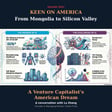
Should a College be a Museum or a Startup? Why Universities Need to Teach Failure
What’s the point of going to college? There used to be an obvious answer to this: to acquire the knowledge to get a better job. But in our AI age, when smart machines are already challenging many white collar professions, the point of college is increasingly coming into question—especially given its time and financial commitment. According to Caroline Levander, author of the upcoming InventEd, the American ‘tradition of innovation’ can transform college today. Levander, who serves as Vice President for Global Strategy at Rice University, argues that colleges must transform themselves from museums into startups. Indeed, the ideal of failure, so celebrated in Silicon Valley, must become a pillar of reinvented universities. And students too, who Levander has suggested have become increasingly conservative in their attitude to personal risk, must also learn to embrace not just innovative technological tools but also the messiness of personal disruption. That should be the point of college, Levander says. To learn how to productively fail.
1. Universities Must Choose: Museum or Startup? Levander argues universities exist on a continuum between museums (curating and preserving accumulated wisdom) and startups (messy, high-risk spaces for creating new knowledge). Most institutions haven’t intentionally decided where they belong on this spectrum, but they need to embrace a more dynamic, startup-oriented position to remain relevant.
2. Student Risk Aversion is the Real Crisis Today’s students are increasingly conservative, focused on maximizing GPAs and taking “safe” courses rather than exploring creatively. Universities must build a “growth mindset” that encourages failure and experimentation—treating creativity as a muscle to develop rather than a fixed trait like eye color.
3. Disciplinary Diversity is America’s Innovation Secret Just as biodiversity sustains ecosystems, disciplinary diversity fuels innovation. Breakthrough moments are unpredictable—Steve Jobs in calligraphy, investor Bill Miller in a philosophy seminar on John Searle. Closing departments and narrowing curricula amounts to “eating our seed corn” and threatens America’s competitive advantage.
4. The Dropout Myth Misses the Point While figures like Steve Jobs, Mark Zuckerberg, and Sam Altman dropped out successfully, Levander asks: “How do we create more Steve Jobses who find the university not a place to leave, but a place to continue building creative capability?” The goal is to institutionalize and scale what now happens by happenstance.
5. Attacking Universities Threatens National Innovation The current political assault on university funding—particularly research dollars—isn’t just bad for Harvard or Rice. It threatens America’s entire innovation economy, since universities remain the primary incubators for industry-creating discoveries that drive national prosperity and competitiveness.
This is a public episode. If you'd like to discuss this with other subscribers or get access to bonus episodes, visit keenon.substack.com/subscribe










